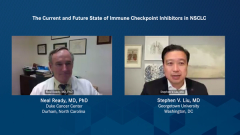
Discontinuing Chemoimmunotherapy in Advanced NSCLC
A brief discussion on when it is appropriate to discontinue chemoimmunotherapy in patients with advanced non–small cell lung cancer.
Episodes in this series

Transcript:
Stephen V. Liu, MD: One of the major questions around immune therapy—as we talk about cost and adverse effects and everything—is, how long do we give immune therapy? A 2-year course of immune therapy could be a couple of hundred thousand dollars, easily. When you consider stopping chemotherapy, at what point do you stop? At 1 year, 2 years, indefinitely, or none of the above? Do you stop sooner than that?
Stephen V. Liu, MD: Neal, I know that you do a lot of drug development there, at Duke [University]. And we have an early drug program here, at Georgetown [University], as well. And I think, if you remember back 10 years ago or so, when these drugs didn’t have names, they were just letters and numbers. Initially, they were given indefinitely. That’s how the studies were initially designed. And at some point, we got a notice that said, “Going to stop at 2 years.” I don’t know if you remember that happening in those studies.
Neal Ready, MD, PhD: I had a patient in [the] CheckMate-017 [trial] whose squamous cell lung cancer progressed, basically, on chemotherapy, on taxol/carboplatin. And she had a huge mass in her right chest wall. And [protocol in] the trial stated, “Treating until not tolerated or progression.” She took nivolumab for 5 years, because she had been told to get her affairs in order. And she was in rough shape when she started. And she said, “Why would I stop? I’m in my 40s. I was told I was going to die. I’m in complete remission. I’m having no [adverse] effects. Why would I stop?”
Stephen V. Liu, MD: It’s hard to argue that, especially when the 2 years is…a little arbitrary, right?
Neal Ready, MD, PhD: Yes. From a CheckMate trial –
Neal Ready, MD, PhD: CheckMate-153. Patients who were stable or having response were randomized to either stop at 1 year, with the chance of restarting, or get 2 years. And it was very clear that progression-free survival was markedly better if you continued for 2 years. There are pretty strong data that, if you are progression-free at 2 years and you stop, you have a 75% chance of being alive at 5 years.
Neal Ready, MD, PhD: I try to stop at 2 years. What do you do?
Stephen V. Liu, MD: I think that it’s important we lay this out upfront. Because you don’t want to get to 2 years and say, “Now, we’re going to stop.” I think that’s really the wrong thing to do. And I think it’s important to explain why we think it’s OK to stop. That, unlike chemotherapy, we’re hoping that we’re inducing memory T cells. We’re hoping that this is a treatment that we won’t have to give forever. And if we continue treatment beyond those years, and sort of keep going, we potentially just increase the risk of immune-related adverse events. And thus, I generally do stop at 2 years.
….I also want to make sure patients are comfortable if we run into adverse effects. Where they’re dangerous adverse effects or just sort of chronically limiting adverse effects, that we will stop before 2 years. And in many cases, those patients do very well. It just sort of tells us we don’t necessarily need to continue that treatment indefinitely or to think that all of our immune systems will respond the same way, to think that a sort of one-size-fits-all duration is going to work. I think is an oversimplification and the real answer is it probably [differs] from [patient to patient]. That there are some [patients who] maybe need exactly 2 years, and there are some who probably need a lot less, and there are some who maybe need more. We’re just not advanced enough to really tease that apart. I don’t know what your thoughts are on that.
Neal Ready, MD, PhD: I agree completely, and as you alluded to earlier, there are a lot of data from the clinical trials for patients who stop treatment due to grade 3 and grade 4 immune-related toxicities that show their overall survival is much better on average than patients who continue with treatment.
Stephen V. Liu, MD: I think we’re just getting comfortable with these sorts of new paradigms where we’re now seeing long-term survival and we have this emotional attachment to the drug. We have to understand that if the drug is acting as we want it to, if it’s doing exactly what we want it to do, we don’t need to continue it forever. And wouldn’t that be nice [for patients] to not have to continue therapy, to be less of a patient, and sort of go into that long-term follow up where we’re just checking in maybe twice a year? That’s really, I think, our goal. I think we all want that.
Neal Ready, MD, PhD: My patient who was on for 5 years is now out over 9 years.
Transcript edited for clarity.




































